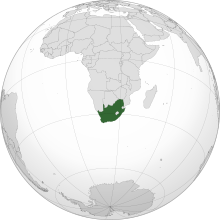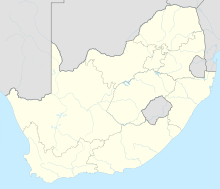
Back Аладатәи Африка Abkhazian Afrika Tunong ACE Къыблэ Африкэ Республикэ ADY Suid-Afrika Afrikaans Südafrika ALS ደቡብ አፍሪካ Amharic South africa AMI Sudafrica AN Sūðaffrica ANG Afirika Osiki ANN
Republic of South Africa 11 other official languages[1]
| |||||||||||||||||||||
|---|---|---|---|---|---|---|---|---|---|---|---|---|---|---|---|---|---|---|---|---|---|
| Motto: "ǃke e: ǀxarra ǁke" (ǀXam) "Unity in diversity" | |||||||||||||||||||||
| Anthem: "National anthem of South Africa" | |||||||||||||||||||||
| Capital | |||||||||||||||||||||
| Largest city | Johannesburg[2] | ||||||||||||||||||||
| Official languages | 12 languages[4][5] Languages with special status[4] | ||||||||||||||||||||
| Ethnic groups (2022[6]) | |||||||||||||||||||||
| Religion (2022)[7] |
| ||||||||||||||||||||
| Demonym(s) | |||||||||||||||||||||
| Government | Unitary parliamentary republic with an executive presidency | ||||||||||||||||||||
| Cyril Ramaphosa | |||||||||||||||||||||
| Paul Mashatile | |||||||||||||||||||||
| Thoko Didiza | |||||||||||||||||||||
| Refilwe Mtsweni-Tsipane | |||||||||||||||||||||
| Mandisa Maya | |||||||||||||||||||||
| Legislature | Parliament | ||||||||||||||||||||
| National Council of Provinces | |||||||||||||||||||||
| National Assembly | |||||||||||||||||||||
| Independence from the United Kingdom | |||||||||||||||||||||
• Union | 31 May 1910 | ||||||||||||||||||||
| 11 December 1931 | |||||||||||||||||||||
• Republic | 31 May 1961 | ||||||||||||||||||||
| 4 February 1997 | |||||||||||||||||||||
| Area | |||||||||||||||||||||
• Total | 1,221,037 km2 (471,445 sq mi) (24th) | ||||||||||||||||||||
• Water (%) | 0.380 | ||||||||||||||||||||
| Population | |||||||||||||||||||||
• 2022 census | 62,027,503[8] (23rd) | ||||||||||||||||||||
• Density | 50.8/km2 (131.6/sq mi) (169th) | ||||||||||||||||||||
| GDP (PPP) | 2024 estimate | ||||||||||||||||||||
• Total | |||||||||||||||||||||
• Per capita | |||||||||||||||||||||
| GDP (nominal) | 2024 estimate | ||||||||||||||||||||
• Total | |||||||||||||||||||||
• Per capita | |||||||||||||||||||||
| Gini (2014) | very high inequality | ||||||||||||||||||||
| HDI (2022) | high (110th) | ||||||||||||||||||||
| Currency | South African rand (ZAR) | ||||||||||||||||||||
| Time zone | UTC+2 (SAST) | ||||||||||||||||||||
| Date format | Short formats: | ||||||||||||||||||||
| Drives on | left | ||||||||||||||||||||
| Calling code | +27 | ||||||||||||||||||||
| ISO 3166 code | ZA | ||||||||||||||||||||
| Internet TLD | .za | ||||||||||||||||||||
South Africa, officially the Republic of South Africa (RSA), is the southernmost country in Africa. Its nine provinces are bounded to the south by 2,798 kilometres (1,739 miles) of coastline that stretches along the South Atlantic and Indian Ocean;[14][15][16] to the north by the neighbouring countries of Namibia, Botswana, and Zimbabwe; to the east and northeast by Mozambique and Eswatini; and it encloses Lesotho.[17] Covering an area of 1,221,037 square kilometres (471,445 square miles), the country has over 62 million people. Pretoria is the administrative capital, while Cape Town, as the seat of Parliament, is the legislative capital. Bloemfontein has traditionally been regarded as the judicial capital.[18] The largest and most populous city is Johannesburg, followed by Cape Town and the busiest port city in sub-Saharan Africa, Durban.
Archaeological findings suggest that various hominid species existed in South Africa about 2.5 million years ago, and modern humans inhabited the region over 100,000 years ago. The first known people were the indigenous Khoisan, and Bantu-speaking peoples who expanded from West and Central Africa later settled in the region 2,000 to 1,000 years ago. In 1652, the Dutch established the first European settlement at Table Bay, and in 1795 and 1806, the British occupied it. The Mfecane, a period of significant upheaval, led to the formation of various African kingdoms, including the Zulu Kingdom. The region was further colonised, and diamonds and gold were discovered, bringing a shift towards industrialisation and urbanisation. The Union of South Africa was created in 1910 out of the former Cape, Natal, Transvaal, and Orange River colonies, becoming a republic in 1961. Though a system of non-racial franchise had existed in the Cape, it was gradually eroded, and the vast majority of Black South Africans were not enfranchised until 1994.
The National Party imposed apartheid in 1948, institutionalising previous racial segregation. After a largely non-violent struggle by the African National Congress and other anti-apartheid activists both inside and outside the country, the repeal of discriminatory laws began in the mid-1980s. Universal elections took place in 1994, following which all racial groups have held political representation in the country's liberal democracy, which comprises a parliamentary republic and nine provinces.
South Africa is a multi-ethnic society encompassing a wide variety of cultures, languages, and religions; it is often referred to as the "rainbow nation" to describe the country's multicultural diversity, especially in the wake of apartheid.[19] Recognised as a middle power in international affairs, it maintains significant regional influence and is a member of BRICS, the African Union, SADC, SACU, the Commonwealth of Nations, and the G20.[20][21] A developing, newly industrialised country, South Africa has the largest economy in Africa by nominal GDP.[22][23] It is tied with Ethiopia for the most UNESCO World Heritage Sites in Africa,[24] and is a biodiversity hotspot with unique biomes, plant, and animal life. Since the end of apartheid, government accountability and quality of life have substantially improved.[25] However, crime, poverty, and inequality remain widespread.[26] Having the highest Gini coefficient of 0.63, South Africa is considered one of the most unequal countries in the world, if not the most unequal.[27][28]
- ^ Constitution Eighteenth Amendment Act (47665) (in English and Tswana). Vol. 697. Parliament of the Republic of South Africa. 27 July 2023.
- ^ "Principal Agglomerations of the World". City Population. Archived from the original on 25 December 2018. Retrieved 30 October 2011.
- ^ a b c "South Africa at a glance". South African Government. Archived from the original on 26 May 2020. Retrieved 18 June 2020.
- ^ a b The Constitution of the Republic of South Africa (PDF) (2013 English version ed.). Constitutional Court of South Africa. 2013. ch. 1, s. 6. Archived (PDF) from the original on 23 August 2018. Retrieved 17 April 2020.
- ^ "The NA Approves South African Sign Language as the 12th Official Language". Parliament of South Africa. 3 May 2023. Archived from the original on 22 December 2023.
- ^ Mitchley, Alex. "SA's population swells to 62 million - 2022 census at a glance". News24. Archived from the original on 11 October 2023. Retrieved 11 October 2023.
- ^ "Statistical Release - Census 2022" (PDF). statssa.gov.za. Retrieved 22 August 2024.
- ^ Cite error: The named reference
Census-2022was invoked but never defined (see the help page). - ^ a b c d "World Economic Outlook Database, April 2024 Edition. (South Africa)". www.imf.org. International Monetary Fund. 16 April 2024. Archived from the original on 16 April 2024. Retrieved 17 April 2024.
- ^ "Gini Index". World Bank. Archived from the original on 29 May 2020. Retrieved 25 September 2018.
- ^ "Human Development Report 2023/24" (PDF). United Nations Development Programme. 13 March 2024. p. 275. Archived (PDF) from the original on 13 March 2024. Retrieved 13 March 2024.
- ^ "Data Source Comparison for en-ZA". www.localeplanet.com. Archived from the original on 16 August 2021. Retrieved 5 May 2021.
- ^ "Data Source Comparison for af-ZA". www.localeplanet.com. Archived from the original on 5 May 2021. Retrieved 5 May 2021.
- ^ "South African Maritime Safety Authority". South African Maritime Safety Authority. Archived from the original on 29 December 2008. Retrieved 16 June 2008.
- ^ "Coastline". The World Factbook. CIA. Archived from the original on 16 July 2017. Retrieved 16 June 2008.
- ^ "South Africa Fast Facts". SouthAfrica.info. April 2007. Archived from the original on 19 July 2008. Retrieved 14 June 2008.
- ^ Guy Arnold. "Lesotho: Year In Review 1996 – Britannica Online Encyclopedia". Encyclopædia Britannica. Archived from the original on 15 June 2013. Retrieved 30 October 2011.
- ^ Marais, Lochner; Twala, Chitja (7 May 2020). "Bloemfontein: the rise and fall of South Africa's judicial capital". African Geographical Review. 40 (1). Informa UK Limited: 49–62. doi:10.1080/19376812.2020.1760901. ISSN 1937-6812. S2CID 218929562.
- ^ "Rainbow Nation – dream or reality?". BBC News. 18 July 2008. Archived from the original on 8 September 2013. Retrieved 10 August 2013.
- ^ Cooper, Andrew F; Antkiewicz, Agata; Shaw, Timothy M (10 December 2007). "Lessons from/for BRICSAM about South-North Relations at the Start of the 21st Century: Economic Size Trumps All Else?". International Studies Review. 9 (4): 675, 687. doi:10.1111/j.1468-2486.2007.00730.x. ISSN 1468-2486.
- ^ Lynch, David A. (2010). Trade and Globalization: An Introduction to Regional Trade Agreements. Rowman & Littlefield. p. 51. ISBN 978-0-7425-6689-7. Archived from the original on 11 October 2013. Retrieved 25 August 2013.
Southern Africa is home to the other of sub-Saharan Africa's regional powers: South Africa. South Africa is more than just a regional power; it is currently the most developed and economically powerful country in Africa, and is able to use that influence in Africa more than during the days of apartheid, when it was ostracised from the rest of the world.
- ^ "South Africa". World Bank. Archived from the original on 1 November 2011. Retrieved 23 July 2021.
- ^ Waugh, David (2000). "Manufacturing industries (chapter 19), World development (chapter 22)". Geography: An Integrated Approach. Nelson Thornes. pp. 563, 576–579, 633, 640. ISBN 978-0-17-444706-1. Archived from the original on 11 October 2013. Retrieved 24 August 2013.
- ^ "World Heritage List". UNESCO World Heritage Centre. Retrieved 16 August 2024.
- ^ Lieberman, Evan (2022). Until We Have Won Our Liberty. Princeton University Press. ISBN 978-0-691-20300-3. Archived from the original on 24 November 2021. Retrieved 25 November 2021.
- ^ ""World Bank" : South Africa" (PDF). Archived (PDF) from the original on 20 April 2023. Retrieved 7 April 2023.
- ^ "World Bank Open Data". World Bank Open Data. Archived from the original on 4 April 2024. Retrieved 4 April 2024.
- ^ Francis, David; Webster, Edward (2 November 2019). "Poverty and inequality in South Africa: critical reflections". Development Southern Africa. 36 (6): 788–802. doi:10.1080/0376835X.2019.1666703. ISSN 0376-835X. Archived from the original on 4 April 2024. Retrieved 4 April 2024.



